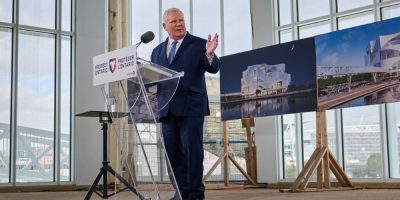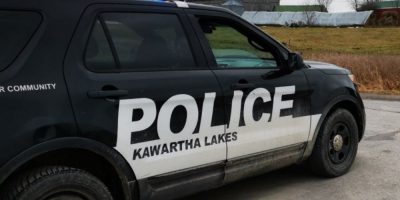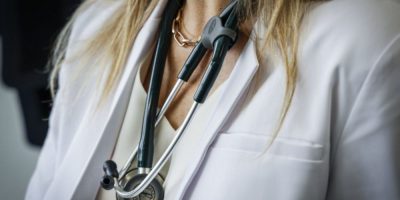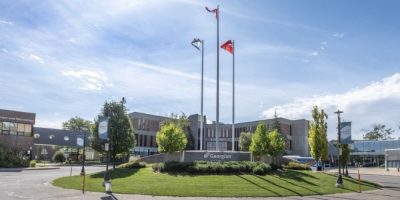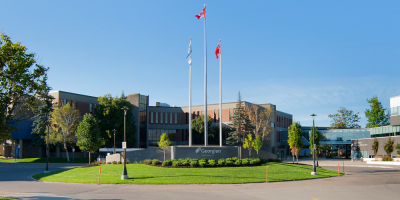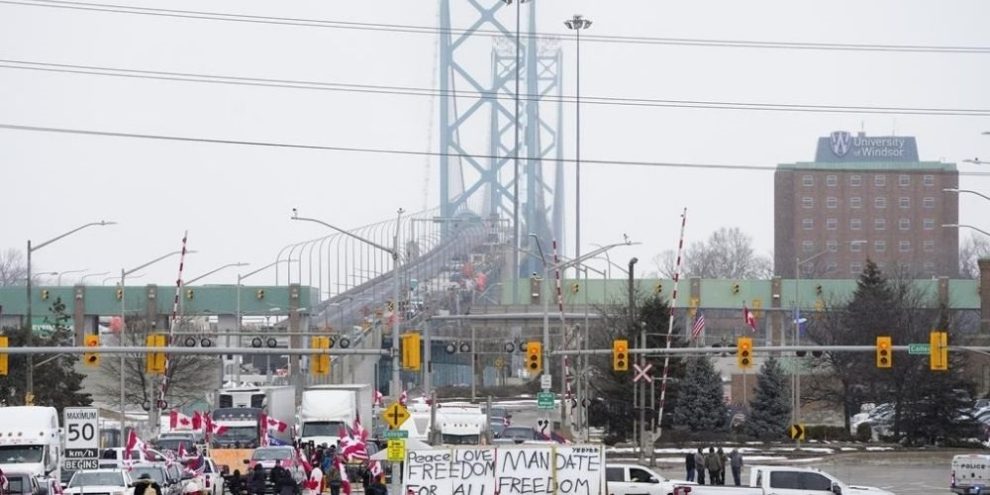
Ontario’s premier declared a state of emergency Friday in response to ongoing blockades in Ottawa and Windsor, Ont., warning of "severe" consequences for protesters who don’t leave.
Doug Ford said he will enact orders making it "crystal clear" that it is illegal and punishable to block and impede the movement of goods, people and services along critical infrastructure, including international border crossings, 400−series highways, airports, ports, bridges and railways.
Fines for non−compliance will be up to $100,000 and up to a year imprisonment.
The announcement came as a protest against COVID−19 measures has immobilized Ottawa’s downtown core for nearly two weeks while another on the Windsor side of the Ambassador Bridge has blocked Canada−bound vehicles from using the key border crossing for days.
At the bridge, protesters cleared vehicles from one lane of a street connecting to the bridge Friday morning, but a few dozen people stood blocking that lane in the afternoon, waving Canadian flags and hoisting anti−vaccine mandate signs.
Local and provincial police were on site and closed all roads to the protest location, allowing people to join the demonstration on foot, but not in their vehicles. Protesters in Ottawa danced in the streets, unmoved by Ford’s announcement.
Speaking in Toronto, Ford said the past two years have not been easy and frustrations have reached a boiling point for many Canadians, but the blockades must end.
"To those who have attempted to disrupt our way of life by targeting our lifeline for food, fuel and goods across our borders, to those trying to force a political agenda through disruption, intimidation and chaos, my message to you is this – your right to make a political statement does not outweigh the right of hundreds of thousands of workers to earn their living," Ford said.
"It does not outweigh our right to get food across our borders. Your right to make a political statement does not outweigh the rights of one million people in Ottawa to live peacefully, free of harassment and chaos in their own homes."
Ford said public health restrictions in response to COVID−19 have helped protect hospitals from collapse and saved many lives.
He noted that Dr. Kieran Moore, the province’s top doctor, is working on a plan to end Ontario’s vaccine certificate system. But that’s been in the works since well before the protests began, Ford said.
"I will never, ever negotiate (with) people that break the law, (with) people that are in there illegally and occupying cities," he said.
"I base it on health. I base it on science. Dr. Moore has clearly said it’s time to move forward. I look forward to Dr. Moore’s measures and recommendations."
Ford said the measures announced Friday will not impede the right to peacefully protest, but will provide more tools to help end the "illegal occupation" of Ottawa and the Ambassador Bridge.
Ontario will also add blocking and impeding the movement of goods, people and services along critical infrastructure as grounds under which personal or commercial vehicle licences could be taken away.
Jessica Faught, who brought her school−aged son to the Ambassador Bridge, said the protest would not end because people are "fighting for their basic human rights."
"Desperate times call for desperate measures and we have stood on the sidelines protesting downtown by the flag, countless protests, countless Facebook links shared with people ... so what more can we do?" she said.
"We have to get the government’s attention that enough is enough."
Provincial police have provided resources to police in Ottawa and Windsor, and the province is going after the convoy’s funding.
The Ontario Superior Court granted a request Thursday from the province to freeze protesters’ access to millions in donations raised on the fundraising platform GiveSendGo.
The court was also hearing an application Friday for an injunction that would bar protesters from blocking the Ambassador Bridge. The Automotive Parts Manufacturers’ Association applied for the injunction, and the City of Windsor was granted intervenor status.
Brad Frederick, who’s out of work because he refused to get vaccinated, said that by opening one lane at the bridge, demonstrators wanted to send a signal ahead of the hearing.
"This is a sign of good faith, to go in and argue in the courtroom and say, ’We’re opening up one lane, but we’re still exercising our rights to protest,’" he said.
Mary Fehr, also at the protest, said she knows someone who’s been unable to work because the blockade has prevented automotive parts from reaching Canada, but she still feels the demonstration is worth it.
"This is a small price to pay if it is going to boost us into the freedom that we all look for," she said.
David Adams, president of the Global Automakers of Canada, said automakers have been hampered by the protests since they began.
"We’re very pleased that we’re finally starting to see some action, but it’s discouraging when it’s taken this long," he said. "It remains to be seen ... how long it’s going to take to actually go from decision to implementation."
The demonstrations have affected three of Toyota Motor Manufacturing Canada’s production lines, pushed Ford Canada to reduce capacity at its Oakville, Ont., and Windsor plants and curbed manufacturing capacity at Chrysler and Dodge−maker Stellantis and Honda Canada.
NDP Leader Andrea Horwath said Ford’s measures were long overdue.
In Toronto, police were preparing for a second weekend of demonstrations, closing streets around the legislature ahead of an expected protest Saturday. It will not be allowed to continue beyond that day, Chief James Ramer suggested.
"We are here to preserve public safety and facilitate peaceful protests, and peaceful protests does not include vehicles jamming up the roadways," he said.
"We have assets in place to make sure if ... vehicles are engaged and they’re not moving, we’re going to move them out of the way."
− with files from Nicole Thompson and Tara Deschamps in Toronto, and Stephanie Taylor and Mike Blanchfield in Ottawa.
This report by The Canadian Press was first published Feb. 11, 2022.
Allison Jones in Toronto and Maan Alhmidi in Windsor, Ont., The Canadian Press

